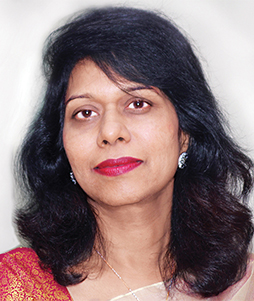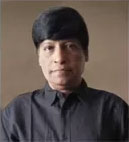
A fascinating account of the highly qualified Dr Kavita Gupta — IAS of the 1985 batch – who broke several glass ceilings, worked selflessly without a break and took path-breaking decisions in the postings she served. After retirement she has turned into a spiritual evangelist in her quest for Enlightenment
Education is the passport to the future, for tomorrow belongs to those who prepare for it today. The more that one reads, the more that one learns, the more one will go places and when education runs through the veins of a compulsive workaholic, you have an ideal package in Dr Kavita Gupta, an IAS officer of the 1985 batch. She is a considered workaholic whose fruits of self-esteem are in the basket of her work – a super achiever committed to results.
The innovative and path-breaking work she has done in 35 years of her eventful career comes as a little wonder when you know that she has a doctorate in Economics from Prescott University, London, four Master’s in Astrophysics/Engineering from IIT Delhi, M.Tech in Behavioral and Social Sciences; also from IIT and Master’s in International Law and International Economics from World Trade Institute, Berne, Switzerland where she was conferred with the rarest and highest honour of ‘Summa-cum-Laude. She also participated in an Executive Education Program at Harvard Kennedy School, USA and was awarded a Certificate on Infrastructure in a Market Economy: Public-Private Partnerships in a Changing World. She also successfully completed a certificate program in “Negotiations for Public Leaders” at the University of California, Berkeley, USA. She also earlier participated in an international program on ‘Women Mean Business’ from DUBS (Durham University Business School), UK and was awarded a Certificate.
As she untwines the threads of her intricately spun life it becomes clear that this exalted status of being a grandee in the profession has come about through a spell of tumult but it also vindicates that all is well that ends well. As one whose scholastic pursuits were always in ample evidence, Ms Kavita never angled for a career in Civil Services but the father, a strict disciplinarian wanted her go for it. Being a true father’s daughter – attached as she was to him – she reluctantly acquiesced to his wish albeit after a deal. “My dad knew I was sort of recalcitrant although I agreed to respect his wishes. I put a condition that I must be allowed to relax, watch movies and I would study on my own terms. He, however knew – and suspected — that I was capable of spoiling it and told me to write answers sincerely. I had my way and watched ‘Kabhie Kabhie’ a day before the exam, hoping fervently that I do not get through with that casual approach. “Unfortunately (laughs) I got selected. I was rather prevailed upon to join because someone else known to family had appeared in all sincerity and hadn’t been able to make it. My heart was just not into it.”
As someone who wanted to pursue either Medicine or English Literature, Ms Kavita saw that she was not comfortable with the decision for almost two years. She went for the IIT but it was a different experience there. One of the only two girls in her section , she found herself diffident in the presence of majority boys. Feeling miserable and uncomfortable, she even toyed with the ideas of pulling out but continued nevertheless. An excellent score in the first two semesters bolstered her sagging spirits. Being a National Talent Search scholar, she had scholarship and the five-year integrated course for M.S. (Physics) was a smooth glide. The fact that there were more girls in the class put her in a better frame of mind and she stood at 9.28 on the scale of 10.
Ms Kavita recalls that as one who was more into the intellectual climes of the IIT, an IAS wasn’t a very stimulating proposition. “My father was still persevering through my Indian Institute of Technology days. Even if you invent a new galaxy, how does it help the people? If you join the IAS, you would strategically impact the lives of millions. It is a divine work, which you would be doing, he reasoned. On my part, I was veering round to the view that the Civil Services would give me a scope to work for the betterment of people. However, the interview went awry as the chairman of the UPSC wasn’t very pleased with my responses. My views didn’t match his. So whereas I scored very well in the written exams, I fared badly in the interview and missed the IAS by 3 marks. I was okay getting in the Customs and Central Excise but there was dad again to prod me. There was little time to prepare but the exams were postponed following the assassination of Indira Gandhi. That gave me a precious month more to study better. The interview this time was a completely different experience. My answers were based more on my knowledge of physics, sociology and philosophy than about the actual subject because I had zero knowledge about Current Affairs. Surprisingly the interviewers were very happy and I got through. I was then doing my Customs training at Chennai and thinking of appearing for a departmental exam. That became redundant.”
The Combinatorics of Physics, Sociology and Psychology paid dividends and she was asked by the interview board that with her knowledge about International Law, why she did not opt for the Indian Foreign Service (IFS) but she had other ideas. She wanted to utilize her knowledge and acumen in Philosophy and Psychology for her own country, she was keen on fulfilling her father’s dream of working for the underprivileged class. That turned out to be prophetic thinking as she succeeded in bringing about a host of innovations and institutionalize path-taking decisions in all the postings she served. Her mother was a pillar of strength so she could pursue the call of duty diligently. The strength she derived from her mother saw her through every travails of life.
She remembers how as the Principal Secretary, Labour, she initiated a number of reforms, brought about amendments in several labour laws that were hailed both by the Labour and the Industry. The International Labour Organization (ILO) lauded them as the best international practices. The unorganized sector was the key beneficiary and how it brought peace to the labour sector was evident with no strikes taking place.
Earlier as CEO of ZP, Wardha, she undertook a highly successful Total Literacy Campaign in 1990-91 wherein she could inculcate a blend of creative and value education in an otherwise suboptimal scenario. It had a salutary effect that brought dropout rate to near zero. She was felicitated by the Secretary General, UNESCO and as she remembers, it was an overwhelming sight when over 3000 teachers from all over the district – who were party to the campaign – came to see her off at the railway station when she was transferred. She was also instrumental in reviving the Mahila Aarthik Vikas Mahamandal whose death knell had been already sounded. She galvanized the Self Help Groups to make it self-sustaining and bringing thousands of women languishing below the poverty line to cross and come over the line. Being a diehard workaholic, however, she focused only on her work and never took to the media to trumpet her achievements.
Ms Kavita is convinced that being an IAS officer does give a strategic advantage to create a multiplier effect, which can benefit a large number of people. That explains how as District Collector she mapped Jalna District through Satellite Imagery in 1995-96, as Secretary Finance, computerized Maharashtra treasuries in 2002 to 2005 and as Additional DGFT, Mumbai, she created systems to ensure transparency and efficiency and got an ISO 9001:2008 certification in 2012-2015. She enabled ease of doing business and in reducing transaction costs.
In hindsight she feels her journey in IAS as extremely rewarding. She feels gratified that she was accepted by the people in full measure. “Being a woman has not mattered to those I worked for. The support from the grassroots was always strong. My interactions and stints in rural areas have been intensely satisfying. I could get first-hand experience of the problems people in rural areas face and could address them by bringing about innovative changes.”
She describes her book ‘Love Only”, available on Amazon, slated to be launched on January 28, 2020 as spiritual journey of an angel who descends from the skies in search of genuine love. “A fusion of Prose and Poetry, it seeks to deduce that you discover true love only when you shed your ego. Acclaimed author Amish Tripathi and Ad Guru Prahlad Kakkar have paid glowing tributes to the book.
Having toiled by the sweat of her brow, Ms Kavita believes there is really no work-life balance. “I have worked hard for 35 years almost 24×7, returning home well past 11pm. I never had any complaints though work and its accruing challenges pumped me up. There was no such thing as pending work with me and the people I worked with , appreciated it well. Post-retirement I am now heavily into Meditation and Spirituality. Poetry and Literature are my other recreations. My spiritual awakening has taught me to assess how far I am from my goals, how much I have to learn and the momentum it needs. In a life of love and compassion, my goal is the great Buddha,” she sums it up.
A Past Life Regressionist, she is also a certified yoga instructor from Aatmabodh Academy of Yoga, Mumbai, in association with Ayush Medical Association, India, and affiliated with World Academy of Traditional Science, Rishikesh, and Uttarakhand. Importantly, she is also a preceptor in “The Heartfulness Way” of meditation and is trained to practice Past Life Regression Therapy, Inner Child Therapy, Family Constellation Therapy, Rene Mey Therapy, Core Somatic Integration Therapy, Mastering Breath Work, Traversing the Frequencies and Creating a Psychic Shield and in Tarot Cards.
As a Tarot reader, she couldn’t have opened better cards.

A Column By
Raju Korti – Editor
The Resource 24X7
A Journalist With 4 Decades of Experience With Leading Media Houses.
